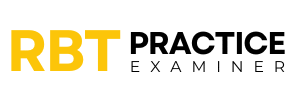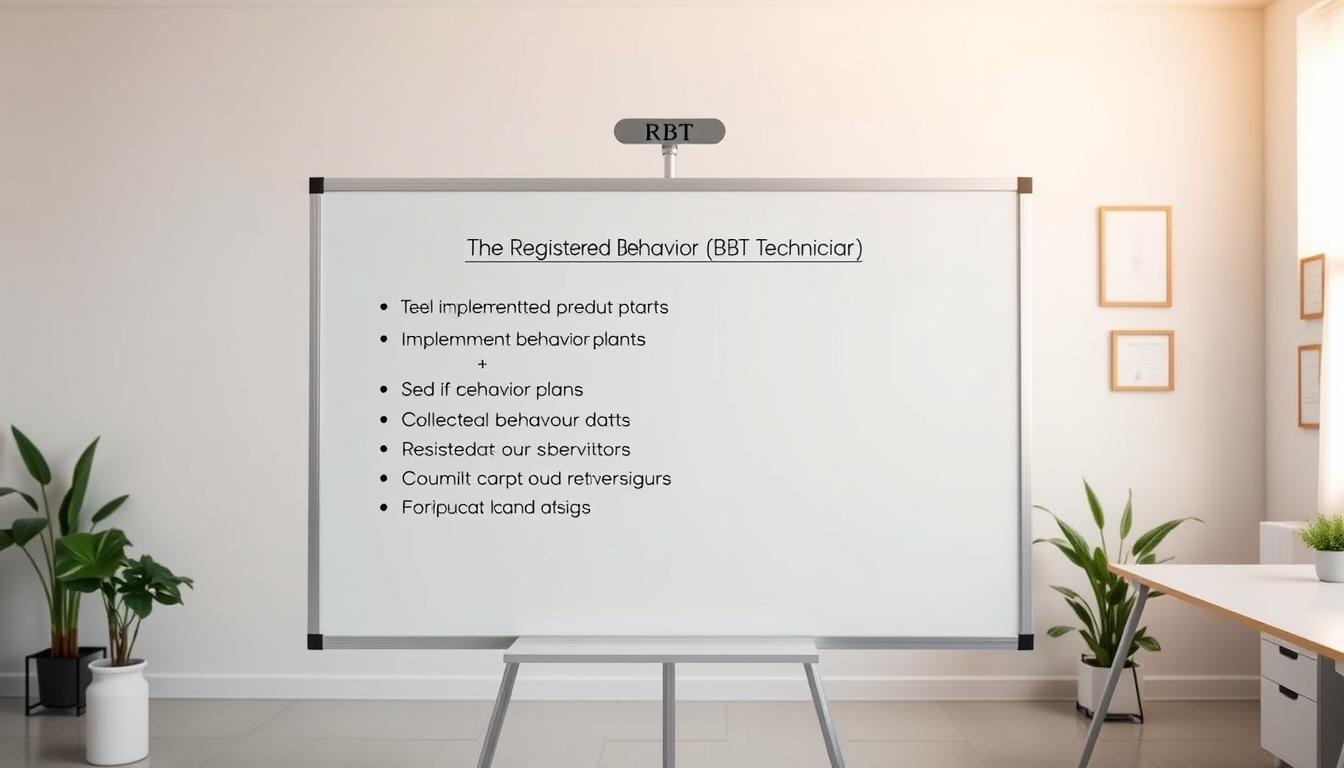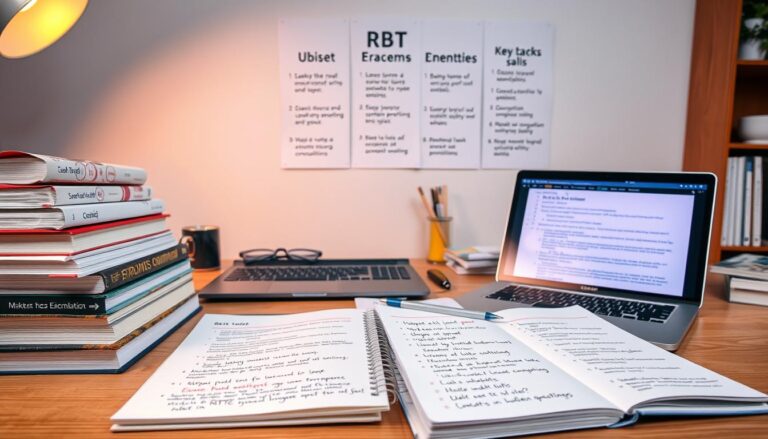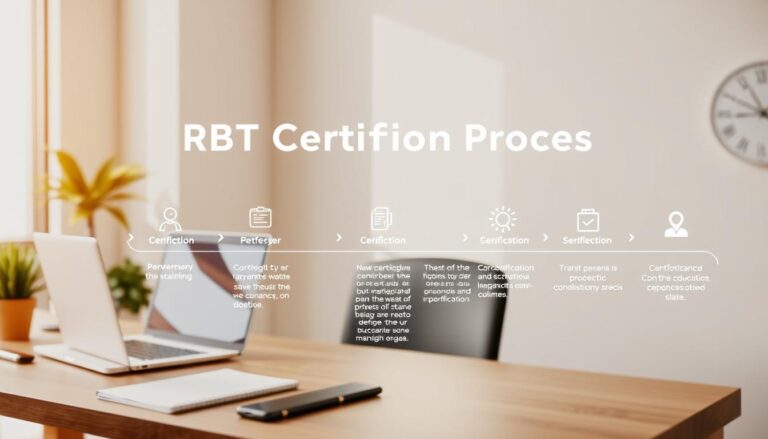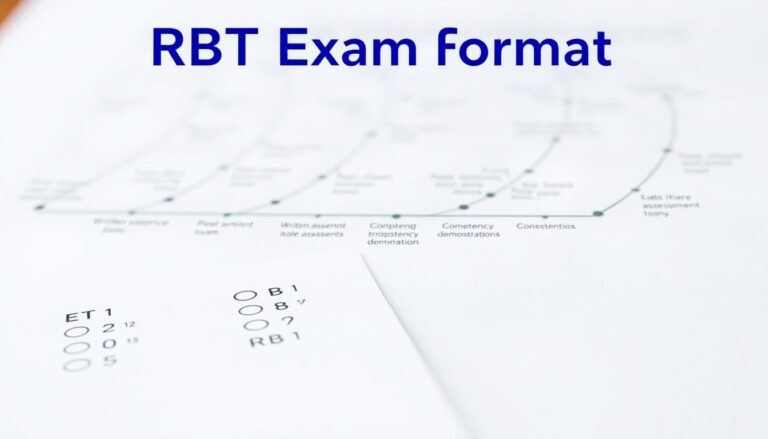RBT Responsibilities: What You Need to Know
Becoming a Registered Behavior Technician (RBT) means you’ll learn a lot about applied behavior analysis. This job needs special skills and a big commitment to help people with behavior issues.
As an RBT, you’ll do things like follow behavior plans, collect data, and work with Board Certified Behavior Analysts (BCBAs). Many people use RBT responsibilities quizlet to learn the important stuff.
Quizlets for RBT might cover things like working directly with clients, tracking their behavior, and sticking to treatment plans. These tools help future technicians get a clear picture of their job.
Good RBTs are great at talking, patient, and know a lot about helping behaviors. They also keep learning and growing to help clients with different needs.
This guide will dive into the world of RBT responsibilities. We’ll look at getting certified, learning practical skills, and what’s expected of you in applied behavior analysis.
Understanding the Role of a Registered Behavior Technician
Registered Behavior Technicians (RBTs) are key in helping people with behavioral challenges, like those with autism. They work with Board Certified Behavior Analysts (BCBAs) to carry out detailed plans to help clients.
RBTs have many important tasks. They are the first line of support in helping clients.
Core Functions and Daily Activities
An RBT’s day includes several main tasks:
- Implementing behavior intervention plans
- Collecting and documenting behavioral data
- Providing direct client support
- Facilitating skill acquisition
- Supporting communication and social interactions
Professional Requirements and Certifications
To become an RBT, you need certain qualifications and training. The certification process makes sure professionals meet high standards.
| Requirement | Details |
|---|---|
| Education | High school diploma or equivalent |
| Training Hours | 40-hour training program |
| Background Check | Required criminal background screening |
| Certification Exam | Comprehensive RBT competency assessment |
Working Environment Overview
RBTs work in various places. They can be found in:
- Clinical treatment centers
- Special education schools
- Home-based intervention programs
- Community support settings
For those getting ready for certification, studying on platforms like Quizlet is helpful. It helps review important concepts and get ready for the exam.
Essential Qualifications and Training Requirements
To become a Registered Behavior Technician (RBT), you need certain qualifications and training. First, you must meet basic educational and professional standards. These prepare you for your important role in behavioral therapy.
The duties of an RBT quizlet highlight several key requirements for this field:
- High school diploma or equivalent
- Minimum age of 18 years
- Successful background check
- Completion of 40-hour training program
Getting the right training is key to understanding your role. The 40-hour course teaches you essential skills and knowledge. This includes:
- Applied Behavior Analysis (ABA) principles
- Ethical considerations
- Professional conduct guidelines
- Client interaction techniques
To get certified, you must pass a tough exam from the Behavior Analyst Certification Board (BACB). You’ll show you know the core skills and practical abilities needed.
| Qualification Requirement | Details |
|---|---|
| Educational Background | High school diploma or equivalent |
| Training Hours | 40-hour training program |
| Age Requirement | Minimum 18 years old |
| Background Check | Must pass a thorough screening |
| Certification Exam | BACB standardized test |
Getting ongoing supervision by a Board Certified Behavior Analyst (BCBA) is vital. It helps you keep improving your skills and follow professional standards.
What Is One of Your Responsibilities as an RBT Quizlet
Registered Behavior Technicians (RBTs) are key in applied behavior analysis (ABA) therapy. Knowing your main duties is vital for success in this challenging yet fulfilling job. RBT job duties quizlet materials often highlight important areas that show you’re up to the task.
To get certified, you need to understand your main tasks well. These duties usually include:
- Implementing behavior intervention plans
- Collecting and recording client data
- Maintaining professional boundaries
- Supporting client skill development
Common Assessment Questions
What is one of your responsibilities as an RBT quizlet usually covers key areas of professional practice. These tests check if you can:
- Accurately follow behavior intervention strategies
- Communicate well with supervisors
- Keep client information private
- Track client progress
Key Study Points for Certification
To pass, you need to master several key skills. Important study areas include:
- Understanding ethical guidelines
- Spotting client behavioral patterns
- Using precise intervention techniques
- Keeping accurate records
Practice Scenarios and Solutions
Being able to apply what you know is what sets successful RBTs apart. Practice scenarios help improve your critical thinking and show you can handle tough situations in behavior analysis.
Implementing Behavior Support Plans

Registered Behavior Technicians (RBTs) are key in putting behavior support plans into action. These plans are made by Board Certified Behavior Analysts (BCBAs). Knowing the RBT scope of practice quizlet rules is vital for doing the job well.
To do it right, there are a few important steps:
- Carefully review the entire behavior support plan
- Understand each intervention’s specific goals
- Follow the plan with precise consistency
- Document all interventions accurately
RBT responsibilities quizlet stress the need for sticking to the plan. This means doing exactly what the BCBA said, without changing anything.
| Implementation Stage | Key Actions |
|---|---|
| Preparation | Review plan, understand objectives |
| Execution | Follow interventions precisely |
| Documentation | Record observations and outcomes |
| Supervision | Consult BCBA for guidance |
If problems come up, RBTs should talk to their BCBA right away. Clear communication keeps clients safe and moving forward.
Staying up-to-date through learning and studying RBT scope of practice quizlet helps technicians keep their work top-notch.
Data Collection and Documentation Procedures
Registered Behavior Technicians (RBTs) are key in collecting and documenting client data. Keeping accurate records is vital for the success of behavior plans. Knowing about RBT ethical responsibilities quizlet helps in keeping records precise and professional.
Data collection is the core of applied behavior analysis. RBTs need to learn different methods to track client progress well. This helps them support their BCBA supervisors effectively.
Types of Data Collection Methods
- Frequency Recording: Counting how often a behavior happens
- Duration Recording: Measuring how long a behavior lasts
- Interval Recording: Watching behavior in set time periods
- Momentary Time Sampling: Checking behavior at set times
Recording and Reporting Requirements
When tackling RBT quizlet challenges, professionals must focus on detailed documentation. Important reporting elements include:
- Detailed behavioral observations
- Outcomes of intervention strategies
- Measurements of client progress
- Timely submission of reports
Data Analysis Basics
| Analysis Technique | Purpose | Key Considerations |
|---|---|---|
| Trend Analysis | Identify behavior patterns | Look for consistent changes over time |
| Graphical Representation | Visualize client progress | Use clear, consistent charting methods |
| Comparative Assessment | Compare baseline to intervention results | Measure intervention effectiveness |
Effective data collection needs attention to detail, ethical considerations, and a commitment to client growth. RBTs must uphold high documentation standards. This ensures the best outcomes for their clients.
Client Interaction and Communication Guidelines

Good communication is key for RBTs. They need strong skills to work well with people of all ages and abilities.
Building a good relationship and keeping professional boundaries are important. Here are some communication tips:
- Use clear, easy-to-understand language
- Listen well and show you care
- Be patient and understanding
- Stay calm and supportive
When talking to clients, RBTs should:
- Build trust by being consistent and reliable
- Use special communication methods from behavior analysis
- Adjust how they talk based on the client’s needs
- Give positive feedback
RBTs also need to work well with families and other professionals. They should share updates, observations, and keep things private.
Every client is different. RBTs who tailor their communication do better. This helps clients make progress and get better results.
Safety Protocols and Emergency Procedures
Registered Behavior Technicians (RBTs) are key in keeping everyone safe during therapy. They need to know all about safety rules to protect clients and themselves. This is very important in different therapy places.
Looking at RBT job duties quizlet, safety steps are a big part of their job. Good RBTs must have strong plans for dealing with risks and surprises.
Crisis Management Techniques
Good crisis management includes a few important steps:
- Spotting signs of trouble early
- Using calm-down methods
- Keeping safe yourself and your client
- Talking clearly with your team
Environmental Safety Considerations
Quizlet questions often ask about checking the environment. RBTs need to find and fix any dangers.
| Safety Aspect | Key Considerations |
|---|---|
| Physical Space | Remove sharp objects, secure furniture, create clear pathways |
| Emotional Environment | Monitor client stress levels, provide calm interactions |
| Communication | Use clear, consistent instructions and positive reinforcement |
Always keep learning and stay alert to keep the therapy area safe.
Collaboration with BCBA Supervisors

Registered Behavior Technicians (RBTs) are key in applied behavior analysis. Their success relies on working well with Board Certified Behavior Analysts (BCBAs). Knowing the RBT scope of practice quizlet shows how vital this partnership is.
Good teamwork has several important parts. These are often tested in quizzes on registered behavior technician responsibilities:
- Clear and consistent communication
- Active listening and feedback integration
- Regular supervision and performance review
- Adherence to intervention plans
RBTs need to talk openly with their BCBA supervisors. They should share client updates, discuss tough behaviors, and ask for help with plans. The RBT scope of practice quizlet stresses the need to know when to ask for professional advice.
| Supervision Aspect | RBT Responsibility |
|---|---|
| Intervention Implementation | Follow BCBA-designed behavior plans precisely |
| Data Collection | Accurately record client interactions and progress |
| Professional Development | Participate in ongoing training and feedback sessions |
Effective supervision is a team effort that needs respect, professionalism, and a focus on client success. RBTs who work well with their supervisors show top-notch skills in behavior analysis.
Ethical Guidelines and Professional Conduct
Registered Behavior Technicians (RBTs) are key in helping people with behavioral issues. They must follow strict ethical rules. This is why RBT ethical responsibilities quizlet resources stress the need for integrity.
Being a professional is more than just doing the job. It’s about caring for clients deeply. RBTs must ensure safety, respect, and respect personal space. They often face tough ethical choices, as quizlet materials show.
Maintaining Client Confidentiality
Keeping client secrets is a big part of being an RBT. It’s about being careful and talking less about clients. Here are some key rules:
- Protect all client personal info
- Only talk about clients when needed
- Keep records safe and secure
- Don’t post about clients on social media
Professional Boundaries
Setting clear limits is vital for RBTs. This means:
- Keeping a safe emotional distance
- Not getting too close to clients
- Talking openly with supervisors
- Respecting clients’ and families’ privacy
Being ethical is not just a rule. It’s a promise to give the best care to those who need it.
Professional Development and Career Growth
Registered Behavior Technicians (RBTs) have many chances to grow professionally. It’s not just about working with clients every day. To move up, you need to plan and keep learning.
Here are some ways RBTs can advance their careers:
- Pursue continuing education credits
- Attend specialized behavior analysis workshops
- Participate in advanced training programs
- Network with behavior analysis professionals
Keeping your RBT certification is key. You need to recertify every two years. This means:
- Getting at least 16 hours of continuing education
- Passing a renewal competency assessment
- Having documented supervision hours
- Keeping your background check current
Career paths for RBTs include:
- Autism spectrum interventions
- Pediatric behavioral support
- Organizational behavior management
- Academic and educational settings
For those who want to go further, becoming a Board Certified Behavior Analyst (BCBA) is an option. This requires a graduate degree and supervised experience.
Staying up-to-date with new research and methods keeps RBTs at the top of their game. This ensures they provide the best care for their clients.
Common Challenges and Problem-Solving Strategies
Registered Behavior Technicians (RBTs) face unique challenges in their work. It’s key to know how to handle these issues to succeed. The responsibilities of an RBT quizlet test candidates on their ability to manage complex situations.
Navigating Difficult Behaviors
Handling tough client behaviors needs specific skills and strategies. The quiz often asks about staying calm and professional under pressure.
- Recognize trigger points for challenging behaviors
- Implement positive behavior support techniques
- Maintain emotional regulation
- Use de-escalation strategies
Effective Time Management Techniques
RBTs have to juggle many tasks while providing top-notch care. They develop strong time management skills to be effective.
| Challenge | Solution Strategy |
|---|---|
| Documentation Overload | Use digital tracking tools |
| Client Scheduling | Implement structured planning system |
| Stress Management | Regular self-care and supervision |
Stress Prevention and Professional Resilience
Mental health is vital for RBTs. Developing personal coping mechanisms helps avoid burnout and keeps client care high. Professional growth and peer support are key to a long-term career.
- Practice mindfulness techniques
- Seek regular supervision
- Engage in continuous learning
- Build a strong professional support network
Legal Requirements and Compliance
Registered Behavior Technicians (RBTs) face a complex world of legal and ethical rules. It’s key to know the RBT job duties quizlet and RBT scope of practice quizlet. This helps keep professional standards high and protects clients.
Legal rules start with knowing important laws. RBTs must follow strict rules to protect client rights and ensure quality care. The main legal points include:
- Patient privacy rules under HIPAA
- Mandatory reporting of abuse or neglect
- Keeping professional boundaries
- Accurate documentation of interventions
Professional responsibility goes beyond just job duties. RBTs must always be aware of their legal duties. This includes:
- Keeping client confidentiality
- Reporting any ethical issues
- Staying within their practice scope
- Keeping certifications up to date
Certification tests often check legal and ethical knowledge. The RBT job duties quizlet usually covers important legal points. This helps professionals keep their certification and give top-notch care.
Important legal points require RBTs to:
- Get informed consent from clients or guardians
- Keep accurate and clear records
- Communicate well with supervisors
- Follow set behavioral intervention plans
Not following legal rules can lead to big problems. This includes losing certification and facing legal trouble. RBTs must stay ahead in understanding and applying these key rules.
Conclusion
Being a Registered Behavior Technician (RBT) is both tough and fulfilling. Learning about RBT ethics through tools like the RBT ethical responsibilities quizlet is key. It gives you a strong base for growing in your career.
Knowing the registered behavior technician responsibilities quizlet helps you handle complex situations well. Every time you work with clients, you have a chance to change their lives for the better. RBTs are important in helping people grow and succeed.
To do well in this job, you need to keep learning, be ethical, and really care about helping others. By always learning new things and being kind and skilled, you can make a big difference. Being committed to getting better is what makes great behavioral health workers.
Being a top RBT means you care about both skills and kindness. Your hard work in understanding and helping people will show in your work. Your dedication will make a big difference in this important field.
